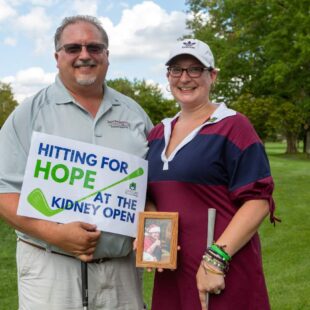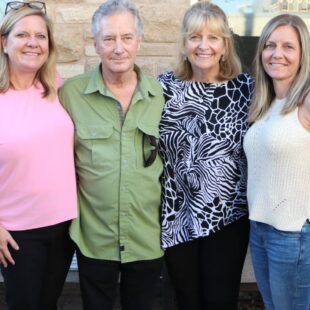Caregiver LifeLine Resources
by Jacquelyn Kates, LSW, CT
Family Support Counselor, Gift of Life Donor Program

Gift of Life Donor Program encourages transplant recipients to write to their donor families. Our Family Support Services Counselors review all correspondence and facilitate the exchange of letters between recipients and donor families.
FAQs for Communicating with Your Donor Family
The hospital did not give me much information about my donor. How can I find out more information about my donor and donor family?
For confidentiality purposes, recipients are not given personal information about their donor or donor family. However, recipients are encouraged to write to their donor family should they wish to learn more.
I do not want to upset my donor family by writing them a letter. When is a good time to write and send the letter?
The best time to write and send a letter is when the recipient is ready. Acknowledging the gift of transplant and thanking the donor family can be an important step in the recipient’s own healing process. If the donor family is not ready to receive a letter, they have the choice to keep it unopened.
Who in my family can write?
Anyone is invited to write to the donor family.
What should I write in my donor letter?
There is no perfect letter. We recommend saying thank you to the donor family for their compassionate decision or honoring their loved one’s wishes. A recipient could share how their life has changed since transplant and what they hope to accomplish with a second lease on life.
Is there anything I should not write?
Identifying information such as last names, addresses, phone numbers, email, and social media accounts may not be shared. If this information is included, it will be removed prior to forwarding to the family. However, make sure recipient includes full name, address, date of transplant, transplant center, and organ received on a separate piece of paper. This information is needed to identify the donor family and forward the letter.
Where should I send my letter?
Gift of Life Donor Program
Attn: Family Support Services
401 N. 3rd Street, Philadelphia, PA 19123
Is it normal to feel guilty after receiving a transplant?
It is very common for recipients to feel guilty after transplant, which is sometimes known as survivor guilt. Speaking to other recipients in a transplant center support group setting or talking with a donor family can be helpful in relieving these uncomfortable feelings. Gift of Life Donor Program and Howie’s House have many donor family volunteers that are open to talk with recipients about their experience.
Can the donor family write to me/my family?
The donor family is able to write to recipients following the same guidelines and process.
When will I hear from my donor family?
Unfortunately, a recipient may not hear from their donor family. Grief is a unique experience and some families may not be ready to write or may not want to.
How can I meet my donor family?
Donor family and recipient meetings are shown in the media, but many recipients do not have the opportunity to meet their donor family. Before a meeting can take place, it is important that there be an understanding of what might occur at a meeting. That’s why Gift of Life Donor Program requires that the donor family and recipient write several letters to build a relationship through correspondence before meeting. Both must express an interest in sharing contact information and meeting. At that point, Family Support Services will send Consent and Release forms.
Once the signed forms are received, personal information will be shared to facilitate direct communication.
Caregiver Lifeline Spotlight
by Laura Giannotti, MSW
Gift of Life Howie’s House Social Worker

Finding Support through your Hospital Chaplain
The transplant journey can bring up many different emotions, questions, and even doubts about your spiritual or religious belief system. For some, faith and spirituality may grow during this time, while for others it raises questions and doubts. Hospital/medical chaplains can offer support and comfort for you and your family regardless of faith, spirituality, practices, or belief system. Chaplains are professionally trained individuals who reach across all faith lines to support patients and their families during a difficult medical time.
How can the Chaplain help you during the transplant process?
Be an additional support person by providing a listening ear Chaplains can offer a warm, compassionate, and judgment-free presence. There may be times when at the hospital you feel lonely, anxious, angry, or confused. Talking with the chaplain about your experiences and feelings may help you feel better. Chaplains recognize that patients and families come from different cultural and religious backgrounds and their goal is to offer you guidance and support in line with your beliefs and comfort level, not force their own beliefs on you. Along with offering support, a chaplain can lend an ear to simply hear your fears and celebrate your joys. Whether you are deeply spiritual, do not believe in a specific religion, or fall somewhere in between, you may want someone to talk to and hear your thoughts. Chaplains can be a sounding board for you, and even offer support around decision making and finding meaning in your own or a loved one’s illness.
Support your beliefs and practices and provide guidance Faith can impact one’s emotional and physical well-being and chaplains can help you strengthen your spiritual health, if desired. This can be in the form of discussing faith-based questions you may have or discussing uncertainties about what you are going through. It can be a conversation around deepening your beliefs. A chaplain may be able to help you with your spiritual needs, such as lending you a Bible, prayer rug, Sabbath candles, etc. Although the resources available will vary among different hospitals, chaplains want to support you and address your spiritual needs in any way that they can. Additionally there may be a time when you want to participate in a religious ritual or receive a sacrament– the chaplain can help you by leading, scheduling, and sometimes even designing these rituals and sacraments. They can also pray with you and for you at any time – while you are at the hospital with the patient for a transplant evaluation, post-transplant appointment, during a hospitalization, while you or the patient is waiting to go into transplant surgery, or while you are visiting the patient in recovery.
Help you connect or reconnect Is there someone you would like to connect or reconnect with? Chaplains can act as mediators or reconcilers when needed. They can also help you connect to a faith community or with a particular belief system. If you would like someone from your faith community to visit, a chaplain may be able to coordinate this visit as well. Hospital chaplains are typically available between Monday and Friday, but at many hospitals, services are available 24 hours a day. Contact your hospital chaplaincy office or speak to your transplant social worker or nurse for specific information regarding their services and your needs. Additionally, please feel free to contact the Caregiver Lifeline Program Social Worker at CaregiverLifeline@GiftofLifeFamilyHouse.org.
By Talia Giordano, MSW, LSW Gift of Life Howie’s House Social Worker
Transplant caregivers are not only caregivers – they may also be a mom, dad, daughter, son, sibling, spouse, significant other, friend, peer, boss, coworker, etc. We all wear many hats in our lives – some of those roles may be long-lasting and some may come and go depending on our stage of life. Excelling at these many roles can be very gratifying and even enhance performance in those roles. However, multiple roles can also mean difficulty managing time, potentially disappointing someone or yourself, creating stress, and even feeling burnt-out. It is important to identify ways to manage each of our roles to avoid becoming overlystressed or burnt-out.
PRIORITIZE: Begin by writing down your different roles and important values and responsibilities within those roles. Think about which are most important and current. It’s helpful to be specific here. For instance, instead of writing family, write the specific roles within your family. Family may be very important to you, but your responsibilities related to each role may vary – example mom, son, or spouse. As you think meaningfully about your roles, you begin to identify the values you place within those roles, which can help to better prioritize and manage them
Example:
1. Spouse – spending [quality] time with my spouse, being an attentive and supportive spouse, feeling loved and providing love.
2. Caregiver – providing support and care to my spouse’s transplant needs such as transportation to appointments and medication help, encouraging them by being positive and bringing hope to my spouse.
3. Work/employee – accomplishing something important, feeling financially stable, helping people.
4. Parent – spending quality time with my adult child, providing support, feeling connected.
5. Friend – laughing with friends, having someone to listen, enjoying hobbies with someone.
PLAN: Plan ways to fit important tasks and responsibilities into your schedule and write them into your calendar. If being a spouse and spending time with your spouse is important to you, then plan on ways to spend time together doing meaningful things. At this time you can also begin to think about whether you want to integrate certain roles, or keep them separate from one another. Integrating or separating is completely up to you and what you feel works best. For example – does spending time with your spouse by going to a clinic appointment also count as “spouse time?”
REFLECT: Sometimes we spend time on tasks or responsibilities that are not meaningful to us. It is important to reflect on how you feel about the different roles you play and how you are managing them. After some reflection, you may realize some tasks should be prioritized higher than others. Some tasks may be integrated with others, while some may not. For instance, if you feel your role as a spouse is weakening because your role as a caregiver is strengthening, then you can begin to identify ways to try and separate the two – example: spending meaningful time with your spouse separate from your transplant-related care time together – going to a movie vs. visiting the doctor. Reflecting on this can help you understand where changes might be best made to better manage the many roles you have as well as reduce stress and improve your overall quality of life.
Looking for additional support or information? Please reach out to our social worker, Talia Giordano, at caregiverlifeline@giftoflifefamilyhouse.org or 267-546-9817.
By: Lucia Cucinotta
 Director of Community, Anjali Power Yoga
Director of Community, Anjali Power Yoga
Take a deep breath in and a deep breath out and I am sure you will already feel a sense of ease. The key of meditation is breath. Allowing yourself the opportunity to breathe helps relax the body, decrease tensions, and help the mind process. Meditation can be an easy, affordable and effective way to reduce the stress and tension caused from being a transplant caregiver. If you simply take 3 to 5 minutes of your day on the below meditation exercise, you can make meditation a healthy life habit.
Find a seat
Sit on the floor, sit on a chair, you can even stand. Finding your seat is finding a place where you can take a few minutes to clear your mind. If you are lucky to find a quiet space, go there. If not, see if you can face a wall or blank space to avoid visual distractions. You can find your seat anywhere, even in your car, the point is to find a space where you can be. If you have a timer on your phone, set it now for 3 to 5 minutes.
Get grounded
If you are sitting, press your sit bones into the ground, lengthen your spine, and bring your shoulders up and back. You want to feel grounded to the earth so you can press down to lengthen and straighten your spine. Engaging your lower core (abs) will help keep your spine long and strait. You can fold your legs or keep them long in front of you. Place your hands on your knees or the tops of your thighs, palms facing up if you need to feel lifted and palms facing down if you need to feel grounded.
Close your eyes
To focus inward for a few moments you must shut your mind from what is going on outside of you. As you close your eyes you will feel your seat shift as your body gets used to this new focus. Avoid squeezing your eyes shut. Close your eyes with ease and begin to relax your face.
Focus on your breath
Begin to take deep breaths by inhaling through your nose and exhaling through your nose. Start with a 3-count inhale and 3-count exhale until you build to a 5-count inhale and a 5-count exhale (ex: breathe in deeply and count to 3 in your head, breathe out slowly and count to 3 in your head). When you reach the 5-count inhale and 5-count exhale, imagine the sounds of your breath are waves of the ocean. Touch the ground or wiggle your toes to feel the sand. Smell the salt air. Perhaps even begin to hear the seagulls. Keep your eyes closed, focus on the center of your forehead, and keep your 5 count inhale and 5 count exhale. Envision the sun as it rises over the horizon in front of you. Allow the colors to paint the sky of your mind. When the sunrise reaches its most radiant point (or when the timer goes off), open your eyes. Sit there for a moment and allow yourself to feel the new sense of ease that has washed over your body and mind.
Make it a habit
You can do this simple meditation exercise for 3 to 5 minutes or more. Remember, some say it only takes 18 days to form a habit. If you can take 3 to 5 minutes out of your day, every day, for 18 days, you can make meditation a healthy life habit!
For more resources and ideas on reducing stress, please visit our Caregiver Lifeline Program webpage at www.GiftofLifeFamilyHouse.org.
By Carlene N. Bowen, RD, LDN, CNSC
Malnutrition prior to transplant is common amongst most end organ diseases. Prior to transplant, most patients have to follow some dietary restrictions due to the limitation of their organs. Some patients hope that having a transplant will elevate some of those dietary restrictions and bring improved quality of life. Contrary to some medical advice, a transplant patient cannot “eat whatever they want”.
The immunosuppressant medication that is taken to protect the new organ may cause some nutrition-related complications, which may require new or additional dietary restrictions. Some of these complications includes, but not limited to diabetes or NODAT (new onset of diabetes after transplant), excessive weight gain, hypertension (high blood pressure) and hyperlipidemia.
The cause of NODAT is multifactorial, with can include, but not limited to factors such as the post-transplant medication regimen, age, weight status and family history. The onset of NODAT can be delayed or prevented by practicing a few healthy habits. Monitoring your blood glucose level is critical step in knowing your risk for DM; this should be done with each post-transplant doctor visit. Your doctor can check a hemoglobin A1C level; this test gives a three month average of your blood sugar. A number greater than or equal to 6.5% indicates a diagnosis of NODAT.
Take control of your diet by limiting foods that contain added sugars such as sweets, desserts, and sugar-sweetened beverages. Instead, choose foods that contain whole grains and that are lower in calories and fat. By making these healthy food choices and exercising on a regular basis, you can maintain a healthy weight and delay diabetes.
Excessive weight gain is common in the transplant population; this can be caused when dietary restrictions are gone thus liberalizing the diets. Some medication can cause an increase in appetite, which leads to overeating of not so healthy foods. Chose foods that are fresh and minimally processed, which include whole grains, lean meats, low-fat dairy products, fruits, and vegetables. Ongoing nutrition education and regular physical activity are two keep components in preventing excessive weight gain. Weight management programs such as Weight Watchers can help the patient to lose and maintain a healthy weight.
Hypertension is a common side effect of immunosuppressant medications. A diet that is low to moderate in sodium (2000-3000 milligrams/day), along with weight management and exercise may help in the management of high blood pressure. Medication maybe required if the blood pressure remains elevated, despite a having a healthy lifestyle. Choose foods that are made from scratch and limit use of pre-made or boxed foods. If you use canned foods, chose those that are labeled as “no added salt” or “low sodium”.
Hyperlipidemia is also a common side effect of some of the immunosuppressant medications that are prescribed. Limiting fats in your diet can help to lower your risk of heart disease. Choose lean meats, poultry, and fish or beans, peas, nuts, or seeds. Cook using low-fat methods like baking, broiling, or steaming. Reduce the amount of fat and oil you use, as well as, using healthier oils, like canola or olive oil.
In addition to following a healthy diet, it is important for a post-transplant patient to take precaution to avoid foodborne illness, by selecting, cooking and storing your food. Some of the basic rules include avoiding undercooked meats, poultry, eggs, raw fish, such as sushi or sashimi, and raw milk or unpasteurized dairy products. Avoid herbal supplements and any over-the-counter medications that were not prescribed by your transplant team.
The registered dietitian (RD) at your transplant program is a great resource for food safety and nutrition information after transplant. If your program doesn’t have an RD, you can find on at the Academy of Nutrition and Dietetics (AND) website www.eatright.org under “Find an Expert”.
About the Author

Carlene N Bowen, RD, LDN, CNSC is registered dietitian for the Jefferson Transplant Institute (JTI) and have over fifteen years of experience in the field of nutrition and dietetics. She has been in this current position for the past six years, where she provides nutrition education for the transplant patients in the heart, kidney, liver, and pancreas program. She also works with any potential kidney and liver donors. She is also a preceptor for nutrition students from various internship programs. Carlene enjoys volunteering with the various organizations, such as The American Heart Association- (AHA) Passion Committee, the American Liver Foundation ( ALF) and the National Kidney Foundation (NKF). She is a member of the Associate Medical Advisory Committee (AMAC) of ALF Mid Atlantic Division and the Academy of Nutrition and Dietetics.
Resources: “Nutrition Following a kidney transplant” Renal Dietitian Practice Group 2015
For more transplant support, please check out the Caregiver LifeLine Program and its resources here!
by: Kirsten Diegel
- Take a Lap – Walk around the whole cafeteria to see the selection. Cafeterias may change the menu daily, and sometimes they have seasonal specials. As you walk around, take note of which options fit your nutrition goals. For instance, are you trying to lose, gain, or maintain your weight? What did your dietitian recommend?
- Food for Thought – Although the staff works hard to prepare foods that are safe to eat, transplant patients need to be especially careful. This is one reason why dietitians spend time educating transplant patients before discharge. Examples of foods to avoid include deli meats and cheeses, salad bars, raw nuts and sprouts, etc. Refer to FDA’s list about food safety as a refresher. If needed, contact your dietitian for an additional copy of Food Safety for Transplant Patients.
- Balance Your Plate – Imagine your plate is divided into 4 sections; fruit, vegetable, protein, and whole grains. Aim to have a plate that has food in each section. Of course, this can be a challenge. At a minimum, try to pair a protein (chicken, turkey, fish, beef, peanut butter, milk, etc.) with at least one other food group (fruit, vegetable, or grain). Having a serving of protein will help keep you feeling full!
- Sip on This – Beverages can boost your calorie intake and weight, which may be a benefit for some but not so great for others. If you are trying to gain weight, high calorie beverages/fluids, such as whole milk, chocolate milk, fruit/vegetable combination juices, protein shakes are options to consider. On the other hand, if your goal is to lose or maintain your weight, water, unsweetened beverages, and low-fat or skim milk is your best bet. Remember: Canned beverages (ex. soda) are not recommended for transplant patients for food safety purposes.
- Keen on Clean – Before eating or drinking anything that you have purchased, take a second to use hand sanitizer to clean your hands, wipe your utensils with a napkin, and wash your fruit. That apple may have been washed in the kitchen, but who knows how many people picked it up before you selected it. During your meal, place your utensil on a napkin or on your plate rather than setting it directly on the table between bites.
About Kristen:
Kirsten Diegel graduated from University of Delaware and completed her Dietetic Internship through ARAMARK in Philadelphia. She is currently pursuing her Master of Science in Health Promotion at the University of Delaware while working as a Clinical Dietitian at Temple University Hospital. Kirsten has worked within the hospital system for 4 years and has been a part of the Lung Transplant Program, one of the oldest and most experienced centers in the region, for the last 3 years. Kirsten is an active runner who is working towards running the New York Marathon in 2017. Kirsten enjoys eating soy yogurt with fruit and almonds/walnuts as a snack to help fuel her workouts, although she will never say no to anything with chocolate.
By Julia Stiffman, Gift of Life Howie’s House Social Work Intern
The holiday season and New Year can be a stressful time for anyone. As a caregiver, you may experience stress year round, but with the holiday season comes added worry. Additionally, caregivers often neglect to think about themselves because they are so focused on their loved one’s health. Between holiday traveling and visiting family, increased spending plus ongoing medical issues and expenses, it is easy to feel pretty helpless as your resources get spread thin. It is crucial for caregivers to prioritize self-care so they can stay as healthy as possible while caring for their loved one. New Year’s resolutions are a great way to start thinking about what’s missing from your life and what you can do to change that.
Listed here are 5 common resolutions that could be especially beneficial to someone in a caregiving position.
1. Learn to say “no”.
Especially during the holiday season when your capacity to handle many responsibilities may be stretched thin. You may be naturally prone to want to help others whenever possible, but everyone needs a break at some point. If you are asked to host a holiday party or to take on a big project, try not to feel guilty for saying no. This can be applied year round. Your friends and family will understand that you have a lot on your plate. With one less thing to stress about, you’ll have more to spend enjoying your holiday season and a great start to 2016.
2. Spend more quality time with your loved one.
As a caregiver, much of your time spent with the patient ends up being in medical settings and discussing their medical status. While it is great to show them your support through the transplant process, both of you need some sense of normalcy in your lives. Find an activity to do with your loved one that’s not medical. It can range from going on a walk to finding a new show to watch together on TV.
3. Consider joining a support group.
Whether your loved one is awaiting a transplant or recovering from a transplant, it is nice to know that you’re not alone in the caregiving process. Support groups are a great way of connecting with other caregivers and comparing notes about the transplant process and how to cope with stress. Your attendance at a support group could prove highly beneficial- both for yourself and for other attendees.
4. Try something new.
When was the last time you did something completely new? When you’ve been a caregiver for so long, your days can start feeling monotonous. Trying a new activity, no matter how little, can feel like a breath of fresh air and will help in breaking up your routine of doctor visits and medical tests.
5. Take some time off for yourself.
Many caregivers may experience burnout at some point. The holiday season can be especially grueling for caregivers as they try to navigate busy schedules filled with medical appointments plus the many holiday parties and family gatherings. Take some time dedicated solely to you. It can be something as simple as turning off your phone for an hour to read a book or watch TV. Whatever it is you choose, make sure the focus is all about you at that time.
By Talia Giordano, MSW, LSW
Finding Support Networks
Becoming a transplant patient or transplant caregiver can be difficult physically and emotionally. It is common to fear the unknown and become anxious about the “wait list” because it is a completely new journey. Often support from others who are also going through the transplant journey or have gone through it in the past, can be exactly the type of support a patient or caregiver may need. However, finding that kind of support can prove challenging if you live in a small town or are far from your transplant hospital. Below are some ways to find the peer-to-peer support that’s right for you.
The Transplant Hospital
Many transplant hospitals have support groups for patients and their loved ones. The groups are typically held monthly and sometimes even scheduled around clinic times, in order to make them more convenient for patients. Please talk with your transplant social worker to find out if your hospital holds a transplant support group.
Coalition Groups
Coalition groups are people who have joined together for a common purpose, such as organ donation and transplantation. In Gift of Life Donor Program’s service area, numerous coalition groups meet monthly to discuss ways to educate and inform individuals in the area about the importance of organ and tissue donation. Many of the attendees are transplant candidates or recipients as well as organ and tissue donor family members. While these groups are not necessarily support groups, they do allow transplant patients to meet families like them in their area, which is a great way to develop new support systems. To find a coalition group in your area please visit our Caregiver Lifeline webpage here.
Peer Mentor Programs
In a peer mentor program, you are paired with another patient or caregiver who has already been through what you are going through. Typically, you would be paired with someone who is around your age, who has successfully been through the same type of transplant and is doing well, both emotionally and physically. Please speak with your transplant social worker to see if your hospital has a peer mentor program. Please note, this type of support may be more difficult to come by, since not all transplant hospitals offer peer mentor groups.
The Internet
The internet offers a surprising amount of support resources for transplant patients! There are hundreds of websites available for transplant patients, which can be wonderful on one hand, but also overwhelming for the typical user. A good place to start for someone who is less internet-savvy is the UNOS-run, patient-friendly site called Transplant Living. It has a community section with stories from other recipients and a way to find support groups in your area.
Another great way to find support groups is through Facebook. If you already have a Facebook account, simply go to the main page and search the type of group you are looking for. For instance, a heart transplant patient might search “heart transplant support group.” You can then reach out to the group leader to learn who is a part of the group, what is discussed, if it is a private group, and how to get involved in order to get the most benefits. A great feature of Facebook support groups is they can be accessed from anywhere in the world. In addition, if you are unsure about joining a support group, Facebook is a great way to test the waters in a less intimidating setting while maintaining some anonymity.
If you would like more help locating a group in your area please feel free to email us at CaregiverLifeline@GiftofLifeFamilyHouse.org. Also if you are a transplant caregiver please consider joining out Transplant Caregiver Support Group
By Talia Giordano, MSW, LSW
During the warmer months, many caregivers may wonder “Will I get a vacation this year?” Coordinating vacations can be difficult, especially if you are a caregiver to a transplant patient. It is common for caregivers to have fears about taking a transplant patient on vacation far from their primary care doctor, transplant team and pharmacy. Caregivers may also feel guilt when taking a vacation without the patient. A vacation can be vital for many people because it allows for relaxation from a hectic schedule. It also can allow a caregiver to regroup and re-energize for whatever their tasks are when they return. Below are some tips that may be helpful when planning for time away.
- Talk to the medical team and ask for resources – The medical team may have suggestions for prescriptions or other medical issues you may encounter while you and the patient are away. Your medical team may also be able to direct you to medical assistance in the area to where you will be traveling. Lastly, if you are traveling without the patient, it is important to inform the medical team that you will be away and that someone else will be assisting the patient during your absence.
- Talk with friends, family and other support systems – Similar to talking with the patient’s medical team, it is important you let your support systems know of your plans so they can step in to assist as needed. Caregivers sometimes find it difficult to ask others for help, but your friends and family want to help, they just may not know how. Be specific with your requests – don’t just say “I could really use your help while I’m away.” Instead ask, “Would you be able to help me by taking [the transplant patient] to their doctor appointment at [this time].” Being specific about your needs will give you relief, knowing certain tasks are being handled, and it will help others to understand exactly how they can help.
- Take time off even if you can’t take a vacation – Many caregivers feel that time off needs to be spent taking care of the patient and this is untrue. All caregivers must take time for themselves to relax. Even if you are unable to take a vacation you may be able to take a “staycation.” A “staycation” is when you take time off for yourself and stay local. During this time you can still do things you love and plan for local trips to museums, parks, or events in your area.
- RELAX! – A vacation is a time for you to relax, re-energize and regroup. Use these tips to plan ahead so that during your time off you can focus on yourself. Enjoy the people, places and things you love and HAVE FUN!
For more information, email CaregiverLifeline@GiftofLifeFamilyHouse.org
News & Events
Stay Connected
Sign up to receive email updates featuring transplant stories of hope and ways you can get involved with the Howie's House.
"*" indicates required fields







